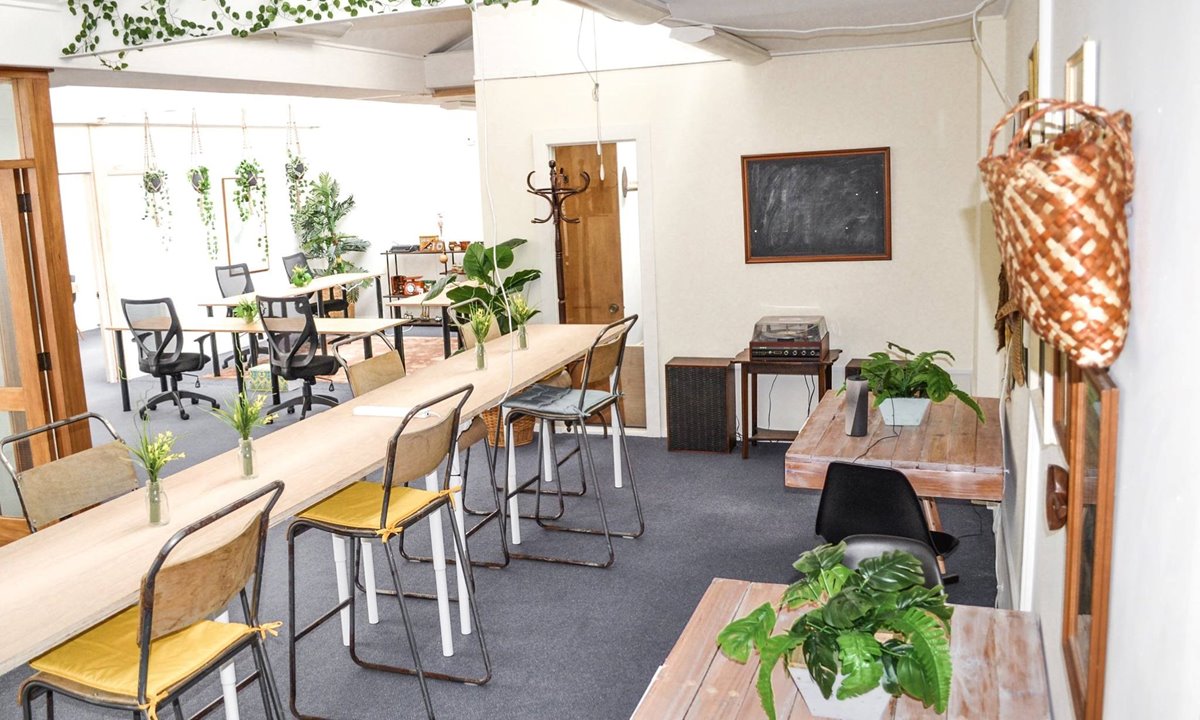The rear section of an office building on Bryce St is fast becoming a nurturing work space for a number of fledgling Hamilton businesses.
Nau Mai is the latest of several co-working offices in the city, having opened its doors in January.
The brainchild of Ian and Talia Musson, the space is so far largely tenanted with early stage start-ups, but the focus is on building a community of like-minded people willing to help and support each other.
“We have deliberately kept the offer simple to have an accessible price point,” Ian said. “For example, we don’t have printing facilities, which people are needing less anyway, so this keeps overheads lower.”
A series of interconnecting spaces, the 1980s construction was thoughtfully designed at the time, with each room bathed in natural light through skylights and windows.
The charming fit-out (pictured) is the work of Ian’s wife, Talia – a graphic designer, with furnishings sourced from op shops and second-hand stores. A mixture of mid-century furniture and Kiwiana-inspired decorative items give it a homely feel.
“We wanted to be different and make sure it didn’t look too clinical. We want a space where our tenants can feel relaxed, but inspired.”
Nau Mai offers a combination of shared open-plan spaces and individual offices. Its capacity is around 30 tenants, already a third full.
There are number of common areas giving flexibility for tenants, such as a casual lounge room, meeting rooms, a presentation area and the 'chalk room’ with a blackboard wall. “Our tenants love this space for brainstorming and nutting out ideas,” Ian said.
The couple’s vision for Nau Mai is for it to be more than a functional business hub… a place of genuine collaboration.
“We promote an ‘ask and offer’ philosophy to encourage our people to build networks, ask for help and see where they can help others alongside them,” Ian said.
Musson’s goal is to potentially replicate the model in other centres outside the larger metropolitan areas. “I can picture a real need in smaller towns. Let’s see what people think here first!”
March also sees the opening of the third Panama co-working building, part of Stark Property, this time on Garden Place. Adding to options at Panama House (Grantham Street) and Panama Cottage (Victoria Street), this will bring their total capacity to just over 100 across the three options.
Stark Property spokeswoman Roxana Davies agrees that coworking spaces are great for freelancers, people who work remotely and small businesses.
“Being part of the Panama community means people rub shoulders with and network with others. We constantly see business connections formed and people collaborating. You can imagine how helpful it is to be able to ask questions of people in other industries – it feels like they’re workmates even though they’re doing completely different work!”
Like Nau Mai, a great deal of consideration has been given to Panama fit-outs.
“We have a big focus on designing spaces that facilitate collaboration, creativity and also business growth,” Roxana said. “We’ve had people start with just one desk and grow to a small office suite and then on to larger, full office tenancies.”
Another benefit of co-working, as Roxana points out, is the day-to-day management tasks that can take up valuable time.
“We pay the power bills, manage the cleaning, look after the printers and wi-fi and ensure there’s always tea and coffee available. We take care of the small things so residents can focus on the important stuff.”
Both Nau Mai and Panama, along with similar spaces like Soda and Waikato Innovation Park’s co-working hub, offer flexible memberships with short-term and long-term leasing options.
Soda Inc has up to 140 desks available in Wintec House. CEO Erin Wansbrough explains that the demand is boosted by our strong Waikato SME sector.
“SMEs are the backbone of New Zealand and this region,” Erin said.
“Co-working spaces provide that sense of community and connection. As long as SMEs are thriving, there will be a need for co-working spaces. A recent study conducted by the University of Auckland says that SMEs account for 98 percent of all the country’s enterprises and 60.4 percent of total jobs.
“Also, corporates with smaller satellite offices in this region don’t want their employees working alone so would rather pay for them to work within a co-working space.”
Chamber of Commerce CEO and former Property Council of New Zealand CEO Chris Simpson can see definite benefits of the co-working model in the city.
“The opportunity in a co-working space is the flexibility because consumables like office support, paper and space are on a weekly or monthly basis and you pay a set fee, with no lease,” Chris said.
“There will always be a need for short-term space and leases from different enterprises as they go through their various growth phases. Options like these from smart landlords ensure a city and its entrepreneurial people will have spaces to grow and become profitable.”



.jpg?sfvrsn=14164ce5_1&mode=crop&width=770&height=462&format=jpeg&quality=85)
.jpg?sfvrsn=414c0434_1&mode=crop&width=770&height=462&format=jpeg&quality=85)
.png?sfvrsn=16db4cf2_1&mode=crop&width=770&height=462&format=jpeg&quality=85)